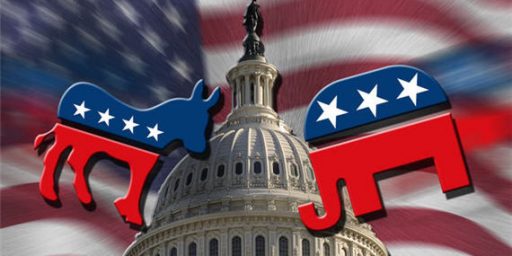USA Parliamentary Democracy?
 National Journal‘s Ron Brownstein sees the recent bout of gridlock in the United States as a sign of a more fundamental shift in how our government operates.
National Journal‘s Ron Brownstein sees the recent bout of gridlock in the United States as a sign of a more fundamental shift in how our government operates.
Obama’s first year demonstrated once again that in this deeply polarized political era, big legislative crusades aimed at big national problems produce only big political headaches. President George W. Bush learned that when his failed drive to restructure Social Security helped trigger his precipitous second-term political collapse. And now, like President Clinton, Obama is at risk of cracking his presidency on the immovable rock of health care reform. Democrats control the White House, the House, and, even after the Massachusetts vote, 59 Senate seats, more than either party has held since 1980, except during the past several months. Yet much of Washington assumes, probably correctly, that Democrats are now condemned to gridlock.
Republicans believe that Obama’s problem is that he’s pushing so much government intervention in the economy. That’s undoubtedly part of the story. But Obama’s larger difficulty is that he’s pushing so much change at a time when filibuster threats are so common that it requires 60 Senate votes to pass almost everything — and the minority party won’t provide the president votes on almost anything. We are operating in what amounts to a parliamentary system without majority rule, a formula for futility.
MoJo’s Kevin Drum picks up on this thread:
In a parliamentary system, party discipline is absolute. With a few rare exceptions, you vote with your party at all times, and there’s no such thing as “bipartisanship.” And it works fine. But it works fine because parliamentary democracies have a bunch of machinery that makes it work: majorities are able to pass legislation, no-confidence votes can bring down an unpopular government, party platforms are taken seriously, etc. We don’t have any of that stuff. What we’ve evolved over the past 20 years is a de facto parliamentary system without any of the machinery that makes it work. The result is national gridlock.
Obviously, we don’t literally have a parliamentary system. Most notably, the president and legislature continue to be elected separately, rather than the legislature choosing the executive.
But it’s certainly true that it’s incredibly hard to get anything done when you combine our system of separation of powers and checks and balances with one with near-lockstep party discipline and a de facto supermajority requirement in the Senate. As Brownstein continues,
Republicans would likely be facing equivalent troubles if they had the power to advance their goal of retrenching government. Does anyone imagine that a President John McCain would be flourishing if he had spent 2009 attempting, over unified Democratic resistance, to impose his campaign agenda of eliminating the tax incentive for employer-provided health care and reducing the growth of Medicare spending? Or that House Republicans would be thriving if they could enact their 2009 budget proposal to literally end Medicare for Americans now younger than 55 and replace it with a voucher to buy private insurance?
In that alternate universe, Democrats would almost certainly be the ones celebrating off-year upsets. The common thread is that it’s extremely difficult to sell this country on big change, in any direction, without at least some bipartisan validation. That’s especially true in today’s communications maelstrom, where overtly partisan media sources tirelessly incite the opposition party’s base against the president.
The conundrum is that the alternative now seems almost unreachable too: building bipartisan coalitions to address big problems. On health care, the root of the Democrats’ troubles, Obama surely made tactical mistakes. But, by any reasonable measure, he pursued an inclusive bill. He reached out more than any previous Democratic president to the medical community and won endorsements from Republican-leaning groups — ranging from drug manufacturers to, incredibly, the American Medical Association — that had ferociously fought every earlier reform drive. At high cost, he allowed the process to stall last summer while Senate Finance Committee Chair Max Baucus, D-Mont., fruitlessly sought compromise with committee Republicans. Now that an always-tangential public competitor to private insurers has been removed, the final Democratic blueprint broadly tracks the 1993 Republican alternative to Clinton’s health plan while advancing newer cost-control ideas that reformers in both parties favor.
There’s no question that the president and the Senate Democratic leadership tried to pick off a handful of the most liberal Republicans — and keep Joe Lieberman and some Red State Democrats on board. At the same time, though, the need to keep the progressive wing of their own party on board meant that they had to keep some aspects in the bill — such as punishing people and businesses who don’t buy health insurance — that even the Olympia Snowes considered too radical.
The current system is doubtless frustrating. While the numbers were never quite this skewed, the Republicans controlled the White House and both Houses of Congress for most of the six years from January 2001 to January 2007 and had very little success passing their domestic agenda, with the exception of now-wildly unpopular programs such as No Child Left Behind and the fiscal fiasco that was the Medicare drug benefit. But those programs are exactly the kind of things that are most likely to break the gridlock: those which both appealed to the ideological sensibilities of large swaths of the opposition party while coming with no real political price.
It may well be that the political calculations of Republicans are such that they’re simply unwilling to make any movement at all on healthcare, figuring any compromise at all will be seen as a win for the Democrats. But I doubt it. Heck, offer to let Olympia Snowe and Susan Collins write the bill!
The problem isn’t just that the opposition party (whether Republican or Democrat) votes in lockstep against the majority. It’s that both parties’ leadership are drawn from the more ideological elements and that the hard core won’t put up with bills that don’t pass ideological muster. Indeed, the likes of NOW would much rather have no bill than one that could draw the support of a few moderate Republicans — or even the most conservative Democrats.






You could have thrown in a line about the increase in independent voters.
The system’s inability to force through radical change quickly is a feature, not a bug.
Well Charles, if you think of it as “damping response” then there must be an obvious trade-off. You might stop excess change, but you might also stop needed change.
California’s budget process seems an example of a system damped into gridlock. It would be sad if California became the model for the nation in that regard.
“the Republicans controlled the White House and both Houses of Congress for most of the six years from January 2001 to January 2007 and had very little success passing their domestic agenda, with the exception of now-wildly unpopular programs such as No Child Left Behind and the fiscal fiasco that was the Medicare drug benefit.”
And tax cuts, tax cuts and still more tax cuts (in other words, the primary Republican domestic agenda).
Working as designed. The system functions best when the built-in competing interests prevent government action. And, frankly, you SHOULD have to have a supermajority to pass legislation that is sufficiently revolutionary to provoke united opposition.
I agree with charles austin on this completely. Progressives represent what? 20% of the electorate. Something like that. That they’ve failed to move their agenda forward is a mark of success rather than failure.
I think that a greater problem than any mentioned above is the seniority system. It results in the representatives with the safest seats, i.e. from the most ideologically uniform districts, wielding the most power.
In that respect it somewhat resembles the British parliamentary system with it “safe seats”, doesn’t it?
It’s funny that some of the pundits who strongly desire a winner take all parliamentary system now that they are on top whined incessently about a unitary executive when they weren’t.
I love that you put a pic of George Clinton up in a post about this parliamentary democracy meme that’s going around. It’s perfectly…appropriate.
Re “California’s budget process seems an example of a system damped into gridlock.â€
Problem with California is they have too many liberals who want to spend more and more money. They were and are fiscally irresponsible and are paying the consequences for it. Unfortunately our Federal Government has done much of the same.
The problem with the Federal government isn’t that they do to little but they do too much. Gridlock can prevent some needed changes but it also prevents a great deal of unneeded changes. Unfortunately not enough of the later.
@Charles
American politics 101:
It’s funny that some of the _____________ who strongly desire/decry a _______________ now that they are in/out, decried/desired a _____________ when they were out/in.
The problem with California is, among other things, it has an antediluvian Republican party, a seriously effed up budgetary process, and an absolutely loony citizen initiative process. All that aside, it was a wonderful place in which to grow up. Now it’s a great place to be from.
Wayne, in taxes per-capita there are 9 states ahead of California.
The thing about California in particular is that don’t have a super-majority to either cut expenses or raise taxes. So they are stuck with a permanent budget gap.
Now there’s a Clinton who did inhale (and probably drank the bong water), and damn right he had sex with that woman. Win.
The difference between the liberal democrats in California and the liberal democrats at the federal level is at the federal level, they print money. Democrats in California have allowed unionization against public interest which has allowed state employees, who produce nothing drain the system of money and ever demand more. The only thing that has kept any thing resembling balance is laws which require a large majority to increase taxes and the ability of the citizens through the proposition system to stop the fools who would steal all they can from us. F**k you liberals.
The End of Representative Democracy (as We Know It)
The lobbyists you will always have among you. (It’s in the Constitution) especially now that the Supreme Court has ruled that corporations have, in effect, the free speech rights of individuals (the “Hillary†documentary film decision). If you think that lobbyists’ influence peaked with 1.the financial bailout, 2.healthcare reform, 3.banking reform, 4.credit card reform, fasten your seatbelts (yes, those seatbelts, the ones that the automobile industry’s lobbyists delayed for many years and after many deaths).
As it stands today campaign financing is so distorted that the re-election rate of the House of Representatives would make most members of the Chinese Politburo blush. It also had Senator Durbin stating that the banks, “… frankly own the place.†(Remember: This is the lobby that threatened world economic catastrophe, demanded a bailout, and dictated the terms.)
Americans could follow the Howard Dean and Barack Obama campaign models and raise money on the internet, taking on the avalanche of corporate largesse directly. Issue-oriented web sites and web PAC’s could indeed revolutionize campaign finance affecting elections at the local, state & federal levels. Instead of a constant schedule of fund-raisers candidates might actually have to listen to all donors of money.
But I would caution those who feel that this “net roots†response would enable a more populist government. The Founding Fathers feared direct elections and direct rule. Hence we vote for officials to represent us and to vote on our behalf. If you think this past summer’s “Town Hall†meetings smacked of mob rule you’ll understand the Founders’ trepidations.
The only exception to representative democracy is the referendum, a process facilitated by the web. And if you want to get an inkling of how this “direct rule by referendum†would work take a look at California & Switzerland. California’s Proposition 13 (passed many years ago) played a large part in creating the state’s crushing debt of over $30 billion dollars today. Switzerland, highly respected for its neutrality in many areas, has a long history of referendum use and has just limited the number of minarets on mosques that could be built in the country.
So imagine a political system that would finance campaigns primarily on the web, thus enabling a whole new level of “rule by referendum.†As a reaction will our government deal with the internet as China does? Did anyone say “Net Neutrality?†It’s hard to tell what our government will look like and how it will operate in the very near future. But the one thing that we can be sure of is that our special brand of democracy is going to cost more money. A lot more money.
Vic Losick
212.580.1266
vi*@lo****.com